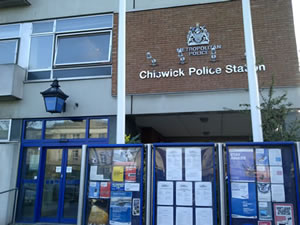Chiswick Police Station Set to Close
Report claims only 1.2 crimes a day reported at front counter
|
A report by the Mayor’s Office into the future of policing in the capital has recommended that Chiswick police station be closed and the building sold off. Over half the stations in London are to be closed in one of the most radical changes in policing in the capital ever. In all 40 out of 73 front counters are slated for closure.
The document which lays out a draft strategy for consultation and was written by the Office for Policing and Crime with the Metropolitan Police states that only 1.2 crimes a day were being reported at the Chiswick station’s front counter. As a result the station is on a list of those that are to be closed and the building is to be sold as part of a programme of asset disposal that is expected to bring in £170 million in capital receipts.

As part of the consultation exercise alternative premises for police officers to start their shifts will be considered with the Chiswick Town Hall building and the fire station possibilities. The nearest front counters to Chiswick will be those in Acton and Shepherd’s Bush (where the Hammersmith and Fulham borough station is to be located while Hammersmith station is being refurbished).
The station avoided closure in 2013 when the then Mayor Boris Johnson instituted a range of cutbacks but it ceased to operate on a 24 hour basis.
Funding for policing in London has been dropping steadily over a prolonged period of the report with over £600 million already cut from the Metropolitan Police’s budget. A further £400 million needs to be identified and it is expected that the station closures will bring in half of that.
In a foreword to the report signed by Sophie Linden, Deputy Mayor for Policing and Crime and Cressida Dick, Commissioner of the Metropolitan Police Service it is stated, “We believe we can replace a current offer which does not meet Londoners’ needs with a new one which is more suited to the way they want to engage with their public services. Our investment in front line policing, and the equipment needed for a 21st century police force, is made possible by selling expensive to run buildings – many of which only support back-office activity – which are underused or no longer needed.
“It is because we know from recent surveys that Londoners value and prioritise local neighbourhood policing that we are diverting resources from poorly used and expensive to run facilities to support the front line. In the context of increasing demand and reducing budgets, choices like these are inevitable, but we are committed to delivering a high-quality, responsive service for Londoners.”
The report states that the closures will allow the number of Dedicated Ward Officers will be increased and new technology will make them more efficient and more accessible.
Over the past three years the proportions of people choosing to report crime through different methods has remained broadly static, with around 70% of crime reported on the phone, around 8% at front counters with very little reported online. When Londoners are asked what their preferred current method of contacting the police is, well over two thirds say that they would prefer to use the telephone, followed by 15% who would prefer to contact in person. Just 10% say they would currently use the website or other digital methods. However the police envisage a big increase in the amount of crime that is reported through their web site and on social media. Over the past ten years the number of crimes reported at front counters has fallen by three quarters and, as a proportion of all crimes reported, has fallen from 22% in 2006 to 8% in 2016 although this may be partly due to previous front counter closures.
The number of front counters in operation has been decrease even before the current changes from 149 in 2008 to 73 currently and a significant proportion of the remainder look set to close. The report claims that as officers generally respond to incidents while out patrolling in vehicles in the community, rather than directly from response bases, there should be no impact on response times from these changes.
Anyone wishing to respond to consultation should do so by visiting www.London.gov.uk/public-access or emailing consultation@mopac.london.gov.uk.
Responses will be received until 5.30pm on 6 October 2017.
July 20, 2017